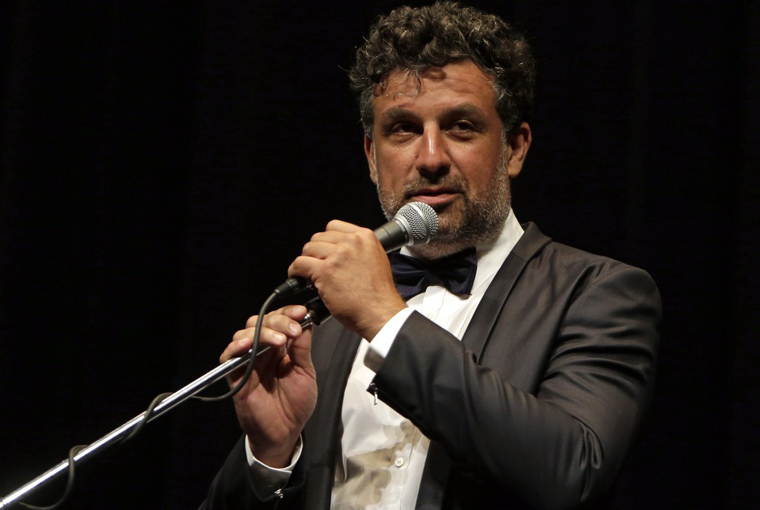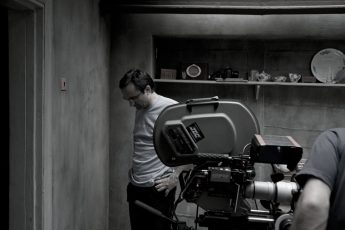
After presenting “Trafic” in Cannes that won the Palme d’Or for Short film in 2004, Mitulescu is back at the festival with his new film “Loverboy”– a love story embeded into the context of prostitution and human trafficking. We spoke to Mitulescu about the emergence of the project, the character constellation in the story, and a possible connection to his first film. “Loverboy” premiered in Cannes as part of the “Un Certain Regard” section…
Can you tell us something about the genesis of your film?
I had a script three years ago. It was initially called The Hardship Balloon, a story about a seventeen year old boy who gets into a band of thieves and then falls in love with his boss’ girlfriend. And then he tries to have a relationship with her. That script was about learning what it means to love. It was about how a seventeen year old boy deals with a girl, without knowing how to love…But I didn’t trust the script. I didn’t like that he was a thief, the story was too melodramatic somehow.
And then I heard the story of the “loverboys”- a documentary at Strada Film. Along with Ivana, the director of this documentary, we followed some boys who just got out of prison, and one of them started to do this job as a loverboy. And this question, what it means to be a loverboy, was something I intended to discover myself. How you can live normally and honor love if your life has no love? So I found the same subject, the story of a boy who is not able to love, but who has a lot of girls and knows how to deal with them. So then the question arose: how can love change you if you live a very intensive life, if you live in a rush, and you don’t have any values to tell what is good from what is bad? How can you lead a normal life, if what surrounds cannot teach you anything? This was what I was looking for. And Loverboy was the perfect story for that.
The Loverboy finds a girl who is able to love, who can rest. It was my challenge to discover, in this fighting life, in the rush, how is it to love, to have a break. Do you have the power to deal with love? I think with all the rush in life, we reach limits. The loverboys are young, they reach their limits and go beyond their limits. If you are a loverboy, which is a profession- at least for the police, what happens if you really like the girl?
What about the girl’s love?
That is another question. She feels so much for the boy that she is able to give her life to him. I talked to a lot of these girls. They all tell you that when you’re fifteen, sixteen, seventeen years old and you fall in love for the first time, you don’t really know what it means to love. You have to give yourself to someone, and that’s life…But when a girl sacrifices herself beyond her instinct of survival, she really reaches a point of no return. And the boy too, needs to feel like he can die all the time. It is part of his life, so when life gets too safe, he looks for something to provoke that adrenaline, to stay beyond.
Did Veli choose to prostitute herself?
This is an important question. If you talk to the loverboys, they all say that it was the girl’s choice. “They know what I’m doing…”. Meanwhile, she is really in love, she is in a trip, in a kind of seduction energy. But still it is her decision. Do you know the story of the blue butterfly?
No…
A king has a young girl who wants to know everything. So he sends her daughter to a wise man who can answer all of her questions. But the girl wants to trick him and looks for a question the wise man cannot possibly answer. And so she finds a blue butterfly that she keeps enclosed in her hands, hiding it from the wise man and asking him if he thinks that the butterfly is alive or dead. If the wise man tells her that the butterfly is alive, she will crush it and prove him wrong. If he tells her that the butterfly is dead, she will set it free. But the wise man responds that the life of the butterfly is in her hands, and that his being alive or dead is up to her.
So I think the girls decide. It is true that at a certain point, it is he who brings her into this world. The more risky the relationship becomes, the more exciting it gets. But some of the girls also say no. In the film, there is the small episode with a girl that says no.
Is there any wise man in your film?
Yes the wise man is…
…the public?
Somehow it has to be… But it’s true that there is no wise man for teenagers in Romania, or maybe even in the world. Even if they see him, they can’t recognize the wise man. It’s normal. But more than ever in Romanian history, teenagers discover themselves. All of a sudden, it is up to them to decide what is good and what is bad, because their parents are weak. They don’t know what to teach. They are not mature enough, and the grand-parents are even weaker. They lived under Ceausescu all their lives. Where find new values? From TV? It is hard.
The police officer in Loverboy is helpless…
I’ve done several months of research talking with a lot of police men. They cannot do anything. It is very hard to convict a loverboy. You have to have the testimony of three girls minimum to open a trial. And even if you have the testimonies, trial procedures take so long that they change their confession. They say “no it wasn’t true”. It is a crime that is very hard to prove. Sometimes they try to work against larger mafia-structures, but the law doesn’t have the power to do anything against the loverboys. Even though there were many cases where girls got killed because they confessed or because they didn’t want to work anymore…It is true that my police man is a weak character…
Your first film, like “Loverboy”, is about troubled teenagers. Is there a way to combine these films?
I finished high school during the the revolution. I was twenty then and traveled around the world. I worked and went through very intense experiences. I still try to understand that period. There are still things I have to think about. Now I have the proper distance to understand. Those are maybe the two things I need to create, being charged with something and have the distance.
Maybe it was the story and the characters that attracted me so much- I don’t know. If you’re twenty, everything seems so intense. Young people are more fresh, direct, sincere. I like that wild way, that energy. It’s the emotion I want to express.
Thank you for the interview.




Leave a Comment